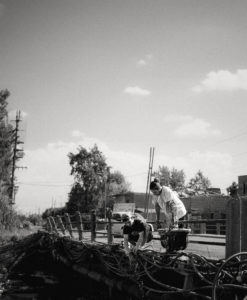 Engaging young people to realize their human right to housing and land through Social Production of Habitat
Engaging young people to realize their human right to housing and land through Social Production of Habitat
Click here to see the the page of the Urban October website: www.hic-net.org/urban-october-2024
Image credits: Proyecto Habitar Argentina.
This World Habitat Day, UN Habitat invites us to reflect on the role of youth in “creating a better urban future.” In the face of the current global housing crisis, it is clear that both today’s youth and the generations to come are finding it more difficult to find affordable and adequate housing options than previous generations. Meeting this challenge requires not only a strong public commitment to housing as a social asset, but also that public action focus on models that guarantee the Human Right to Adequate Housing for all.
Habitat International Coalition (HIC), building on its previous experiences and lessons from Members around the world, has been promoting the realization of the Human Right to Adequate Housing through the Social Production of Habitat. In an era of increasing conservatism, disparity and segregation, the fulfilment of basic rights such as housing must be grounded in processes that guarantee equitable and sustainable access to, us of, and democratic control over land and apply democratic principles through people’s agency.
The right to adequate housing is inextricably linked to the human right to land. The world’s poorest people face increasing difficulties in accessing, using and democratically controlling land to live and work on. When social movements occupy well-located land, they are often criminalized. Inhabitants of informal settlements try to defend their rights to the land they legitimately occupy, usually out of sheer human need. Economic oligarchies interpret law based on the logic of the real estate market, and the popular neighbourhoods are considered illegal. Settlement dwellers are stigmatized as usurpers and, hence, criminalized, although their defense revolves around the protection of their human right to housing, which they build with their own means by creating new neighbourhoods and communities.
HIC joins communities around the world on this World Habitat Day in defending and fulfilling their human rights to housing and land through the initiatives, practices and strategies broadly understood under the umbrella of Social Production of Habitat. HIC and its global partners are convinced of the transformative power of such community-led processes to produce affordable, sustainable and democratically managed housing solutions. In the developing world, this mode of production outstrips the production of public and private sectors combined, but it often omitted from GDP and other economic metrics.
With proper legal, regulatory, financial and policy tools, these experiences could represent a viable model for overcoming the global housing crisis with community-led responses adapted to local contexts and realities that uphold democratic principles in the face of speculation and commodification. Furthermore, these pre-emptive and remedial measures could have a significant impact by both incorporating an intersectional approach that aims to reverse discriminatory patterns of housing, disadvantaging women with children in the poorest households, and instead caring for the planet as our “big house” that includes people from a social- and climate-justice perspective.
The Social Production of Housing and Habitat allows for multiple options ranging from the improvement, extension and consolidation of housing; the construction of new housing, ongoing or completed; collective and cooperative housing; the improvement of neighbourhoods and rural settlements; and the democratic production and management of large urban complexes and rural communities.
The social production of housing and the residential, recreational, productive and service spaces that surround it reflects the identity of the inhabitants and, in the most-organised cases, leads them to remain committed to the convivial, supportive and open community management of their places. It also brings clear benefits in terms of sustainability (e.g. through the use of local materials), access to land and activation of the local economy and the development of economic activities within the housing framework.
Actions to support the social production of habitat
HIC and its global partners propose the following measures as enablers to support the Social Production of Habitat:
- (A) Measures to guarantee security of tenure for inhabitants, to stop, prevent and prosecute forced evictions, and to end the criminalisation of popular movements fighting for their human right to adequate housing;
- (B) Ensure access to and democratic control of land for community-led projects and popular housing;
- (C) Ensure the policy and economic/financial means (including land) to support and scale up SHP initiatives; e.g., through neighbourhood improvement programmes, inclusion of self-managed and cooperative housing in national housing plans and programmes, provision of technical and financial support for community-led construction, among others;
- (D) Co-develop policies and programmes through channels of substantive participation and co-management together with the inhabitants, and from an intersectional perspective, stimulating training, capacity building, consultation and dialogue in the development of programmes and policies, as well as enhancing self-management practices and incorporating the knowledge and proposals of the population.
The HIC President and Vice President wish its Members and the communities they represent around the world a fruitful and reflective World Habitat Day that leads to actions realizing the human right to adequate housing for all.
